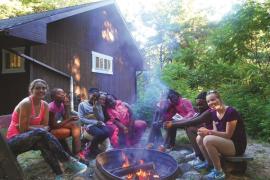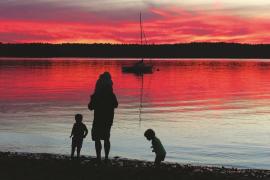Over the past five decades, I have attended and presented sessions at many conferences, seminars, and educational events offered by the Maine Youth Foundation; ACA, New England; and ACA national. I served for six years on the Editorial Advisory Committee for Camping Magazine. Out of all the issues that are discussed, the question for me has always been: "What about the children?"
In my view, the innermost being of children has not changed over the years — even in a world that is constantly changing and so much more complex to grow up in, with decisions to make that challenge a child of any age. Yet, children stomp in puddles, give sticky kisses and fistfuls of dandelions, hug us in a hurry, sing off-key, and slurp their soup. The sparkle in their eyes and the smiles on their faces make our hearts sing. They thrive with testing us, are not able to explain themselves very well, their fears are terribly real, and they flourish with understanding and love. Because of my experience in camping, I propose that throughout the years, the fundamental nature of children seems to have remained the same.
Our camp celebrated its 100th anniversary this summer. Former campers and staff, in their comments, seemed to answer the question: "How do we do our job to the best of our ability with the children who are near and dear to the hearts of their parents, decade after decade — then, now, and in the future?" A couple of their responses follow:
Today we read and hear all about the Internet, and most of us have been online. Many campers will have been driving on the Information Super Highway long before they've gotten their learner's permit. But I think that the camp web contains more interesting, important, and even revolutionary information within it than any World Wide Web. The way we feel about each other at camp is a timeless thing. It is also a radical thing within this fragmented society we call home. The heartfelt connections with other people may be the most authentic ties we make in our lives. The experience of living simply in nature throws our relationships with each other into relief. The children have meaningful conversations with adults because counselors listen so carefully to what children have to say. Where else does this happen in our lives anymore? Finally, we see the important things: traditions passed down, communication between people, simplicity, creativity, compassion, continuity, and values. When we take these experiences and feelings back to our cities and towns, it is truly radical infiltration.
To whoever coined the phrase "you can't go home," I say: "YES YOU CAN!" The exquisite beauty of camp is still the same. You look at the waterfront and you can see yourself swimming and sailing, the dining hall is still filled with laughter, chatter, and song, and the sunsets and campfires all make an alumna feel right "at home." I even got to shoot a rifle after forty-plus years! Everything is there — just how you remembered it as a child. So from the bottom of this camper's heart, thank you for the opportunity to return to camp again and experience so many of the things that made us who and what we are today.
I was listening to National Public Radio and the comment was made: "If we are going to teach the world not to hate 'different,' we must start by teaching the children." Where else is this done better than living day by day in a camp setting? This is the challenge to all of us in the camp profession, from an alumna: "We can see you are doing the most important work in the world — building character into girls who will be called upon to make their own contributions to a yet unseen world."
I don't know a lot about a lot of things, but I do know that it is the quality of the journey that matters most in life. Camp is the reality of the day and the vision as far as the soul can see. After fifty-four years in camp, I am convinced that the camp experience is a vital component in the development and education of the whole child. I believe we should listen to the children with all of our intellect and connections of the heart. They will define the job we need to do in camp, and with our guidance they will find their place in this complex world. And so it was then, it is now, and will be in the future. The question remains: "What about the children?" I am humbled and privileged to have traveled the journey through children's lives for over five decades. In my view, sharing the joy of the human spirit inherent in camps across this country and abroad is a blessing to anyone who experiences it.
June W. Gray is the owner/director of Camp Wawenock in Raymond, Maine.


